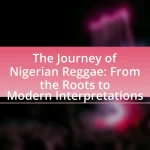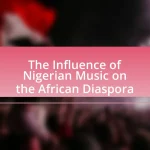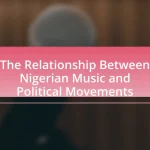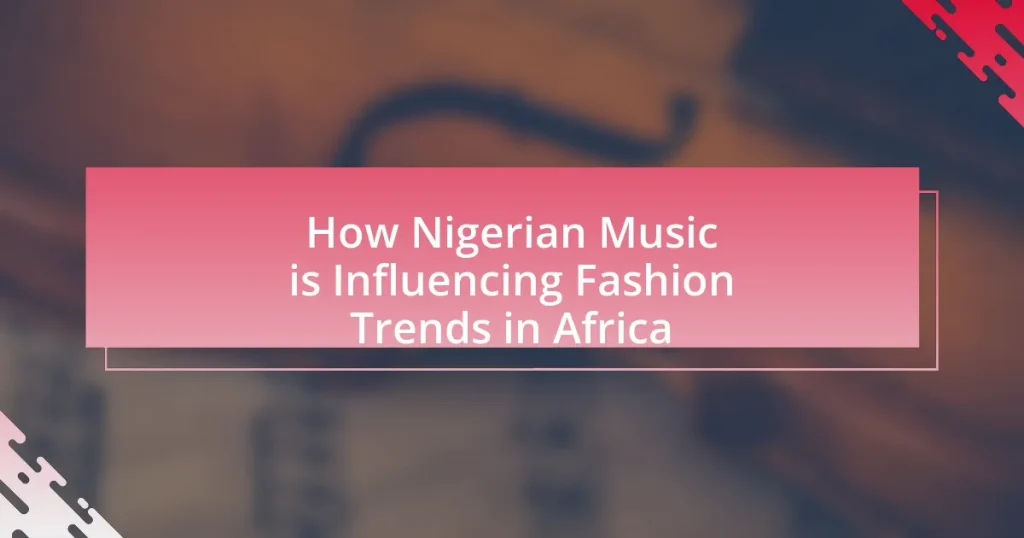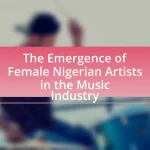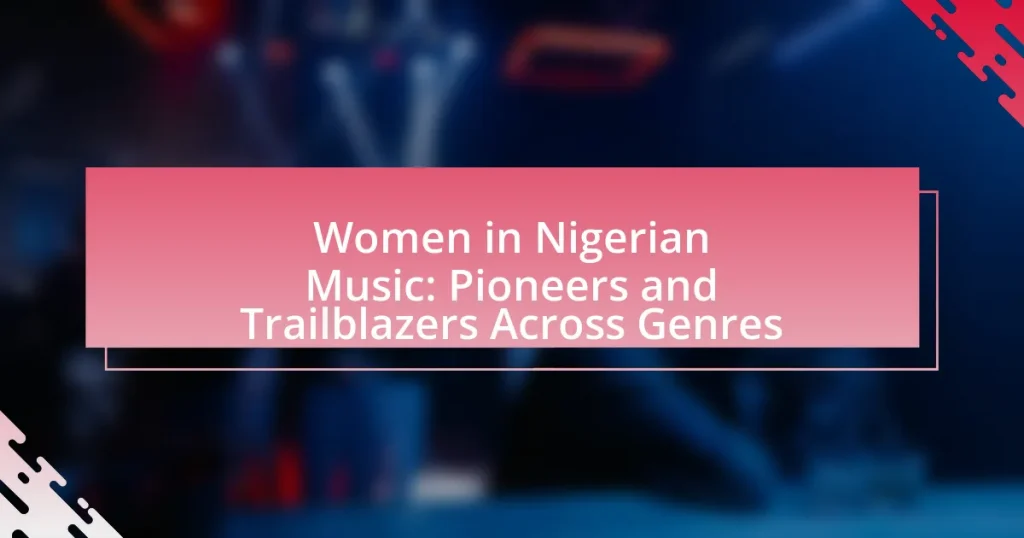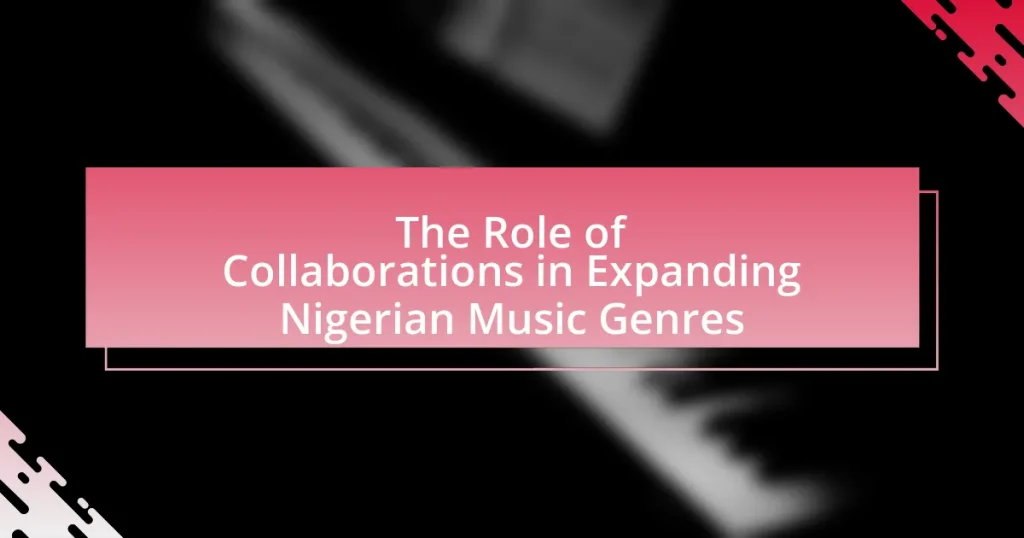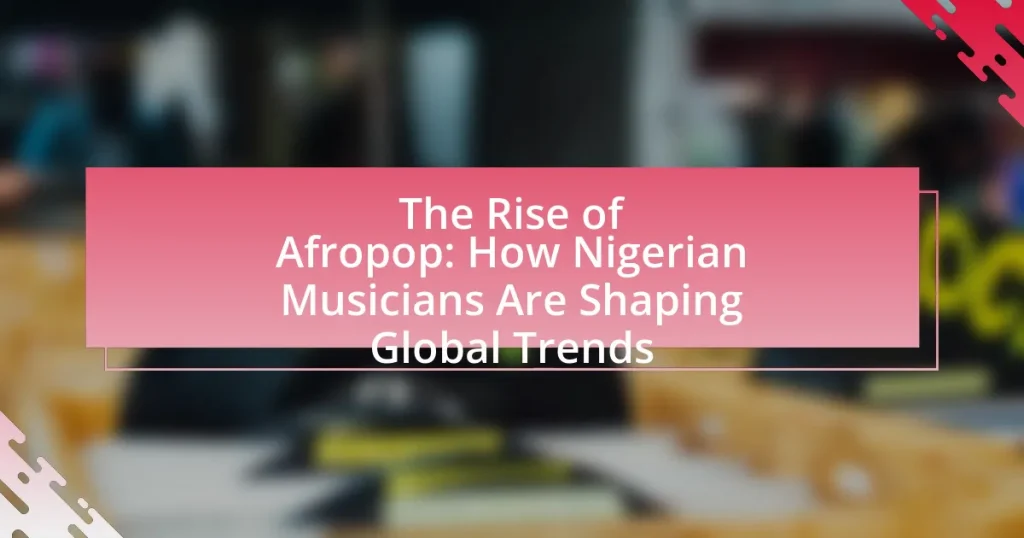Nigerian music, particularly genres like Afrobeats and Highlife, is significantly influencing fashion trends across Africa by popularizing traditional attire and contemporary styles through the global reach of artists such as Burna Boy and Wizkid. The article explores how these musicians showcase vibrant cultural expressions in their music videos, leading to increased demand for locally made clothing and collaborations with fashion brands. Key elements of Nigerian music, including cultural storytelling and traditional instruments, inspire unique fashion choices, while social media amplifies the visibility of these trends. The intersection of music and fashion is further highlighted through the role of influencers and the evolving reinterpretation of traditional garments in modern fashion.
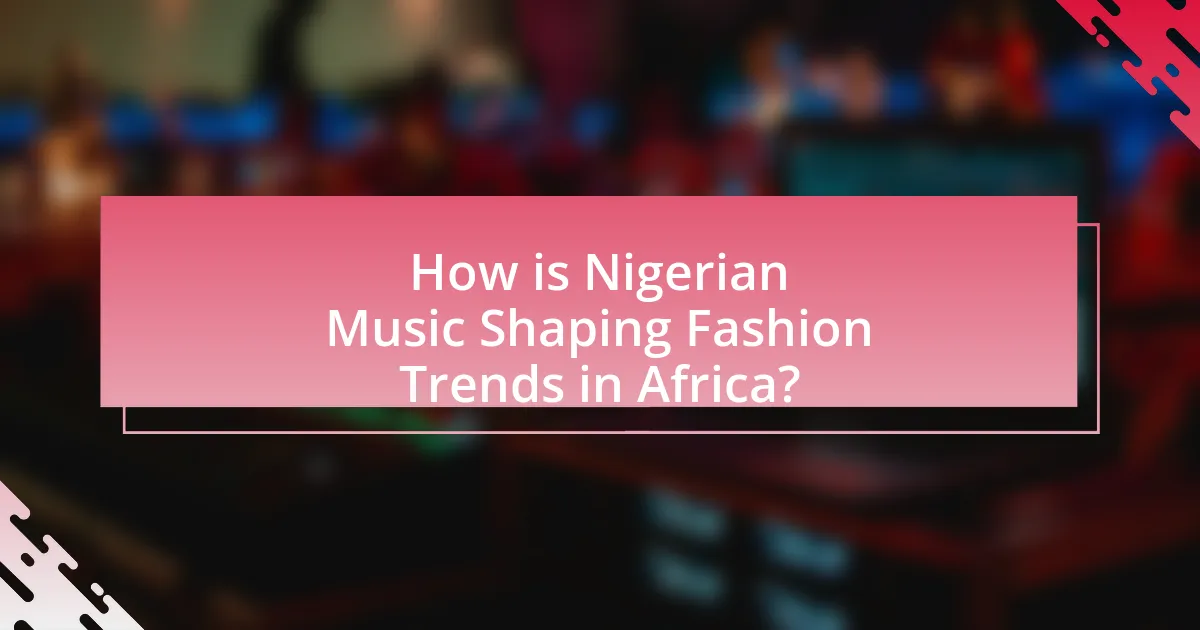
How is Nigerian Music Shaping Fashion Trends in Africa?
Nigerian music is significantly shaping fashion trends in Africa by popularizing unique styles and cultural expressions through its global reach. Artists like Burna Boy and Wizkid often showcase traditional Nigerian attire, such as Ankara prints and agbada, in their music videos and performances, influencing fans and fashion designers across the continent. This visibility has led to a resurgence of interest in African fabrics and designs, with a reported increase in the demand for locally made clothing that reflects these musical influences. Additionally, collaborations between musicians and fashion brands have further solidified this trend, as seen in partnerships like Wizkid’s collaboration with the brand Dolce & Gabbana, which highlights African aesthetics on international platforms.
What are the key elements of Nigerian music that influence fashion?
The key elements of Nigerian music that influence fashion include vibrant rhythms, cultural storytelling, and the use of traditional instruments. Vibrant rhythms, characteristic of genres like Afrobeats and Highlife, inspire bold and colorful fashion choices, reflecting the energy of the music. Cultural storytelling in lyrics often highlights traditional attire and styles, leading to a resurgence of indigenous fabrics and designs in contemporary fashion. Additionally, the use of traditional instruments, such as the talking drum, often inspires unique patterns and motifs in clothing, merging musical heritage with fashion innovation. These elements collectively shape fashion trends, making them a direct reflection of Nigeria’s rich musical landscape.
How do music genres like Afrobeats and Highlife impact clothing styles?
Afrobeats and Highlife significantly influence clothing styles by promoting vibrant, colorful, and culturally rich fashion choices. These music genres often showcase artists wearing traditional African attire, modern streetwear, and unique accessories that reflect their cultural heritage. For instance, the popularity of Afrobeats artists like Burna Boy and Wizkid has led to a resurgence in the use of Ankara fabric and bold patterns in everyday fashion, as fans emulate their styles. Additionally, Highlife music, rooted in Ghanaian culture, emphasizes the importance of traditional garments, which has inspired contemporary designers to incorporate these elements into modern clothing lines. This fusion of traditional and modern styles not only enhances personal expression but also fosters a sense of cultural pride among listeners and followers.
What role do music videos play in setting fashion trends?
Music videos play a significant role in setting fashion trends by showcasing artists’ styles and influencing viewers’ perceptions of fashion. The visual medium allows for the immediate presentation of clothing, accessories, and overall aesthetics, which fans often emulate. For instance, Nigerian music videos frequently feature vibrant, culturally inspired outfits that resonate with local and global audiences, leading to increased demand for similar styles. This phenomenon is supported by the rise of social media platforms, where viewers share and replicate looks seen in these videos, further amplifying their impact on fashion trends across Africa.
Why is Nigerian music particularly influential in the African fashion scene?
Nigerian music is particularly influential in the African fashion scene due to its global reach and cultural significance. The rise of genres like Afrobeats has not only popularized Nigerian artists but also showcased vibrant fashion styles that resonate with audiences across the continent. For instance, artists such as Burna Boy and Wizkid often incorporate traditional Nigerian attire and contemporary fashion in their music videos and performances, setting trends that fans eagerly adopt. This synergy between music and fashion is further amplified by social media platforms, where fashion choices of popular musicians quickly gain traction, influencing local designers and fashion enthusiasts. The combination of music’s emotional appeal and fashion’s visual impact creates a powerful cultural exchange that shapes trends throughout Africa.
How does the global reach of Nigerian artists affect local fashion?
The global reach of Nigerian artists significantly influences local fashion by introducing diverse styles and trends that resonate with both local and international audiences. As Nigerian musicians gain international recognition, they often showcase unique fashion choices that blend traditional African aesthetics with contemporary styles, inspiring local designers and consumers. For instance, artists like Burna Boy and Wizkid frequently wear outfits that incorporate vibrant colors and traditional fabrics, which encourages local fashion brands to adopt similar elements in their collections. This cross-pollination of styles not only elevates the visibility of Nigerian fashion on a global scale but also fosters a sense of pride and cultural identity among local consumers, leading to a resurgence in the popularity of indigenous fashion.
What cultural factors contribute to the fashion influence of Nigerian music?
Cultural factors such as traditional attire, the prominence of celebrity influence, and the integration of indigenous styles significantly contribute to the fashion influence of Nigerian music. Traditional attire, like the agbada and gele, often features prominently in music videos and performances, showcasing Nigeria’s rich heritage and inspiring contemporary fashion trends. The celebrity influence of Nigerian artists, who often set trends through their unique styles, drives the adoption of specific fashion elements among fans and the broader public. Additionally, the fusion of indigenous styles with modern fashion, as seen in the works of artists like Burna Boy and Tiwa Savage, reflects a cultural pride that resonates with audiences, further solidifying the connection between Nigerian music and fashion.
Who are the prominent Nigerian artists driving fashion trends?
Prominent Nigerian artists driving fashion trends include Burna Boy, Wizkid, and Tiwa Savage. Burna Boy is known for his unique style that blends traditional African attire with contemporary fashion, influencing global trends. Wizkid often showcases high-end streetwear and has collaborated with international brands, further shaping fashion perceptions. Tiwa Savage is recognized for her bold fashion choices, often incorporating vibrant colors and patterns that reflect Nigerian culture. Their influence is evident in the rise of Afrocentric fashion on international runways and social media platforms, showcasing the intersection of music and fashion in contemporary culture.
What styles are associated with artists like Burna Boy and Wizkid?
Burna Boy and Wizkid are primarily associated with Afrobeats, a genre that blends African rhythms with elements of hip-hop, dancehall, and R&B. Their music often features vibrant melodies, rhythmic beats, and culturally rich lyrics that resonate with a global audience. Both artists have significantly influenced fashion trends by incorporating traditional African attire, contemporary streetwear, and luxury brands into their public personas, showcasing a fusion of cultural heritage and modern style. This blend not only reflects their musical identity but also promotes African culture on a global scale, as seen in their performances and music videos that often highlight unique fashion choices.
How do collaborations between musicians and fashion designers emerge?
Collaborations between musicians and fashion designers emerge primarily through shared cultural influences and mutual branding opportunities. Musicians often seek to enhance their artistic expression and public image, while fashion designers aim to reach wider audiences and gain credibility through association with popular artists. For instance, the rise of Afrobeats in Nigeria has led to numerous partnerships where artists like Burna Boy and Wizkid collaborate with local designers to create unique fashion lines that reflect their musical identity. This synergy not only amplifies the visibility of both parties but also fosters a vibrant cultural exchange that resonates with fans and consumers alike.
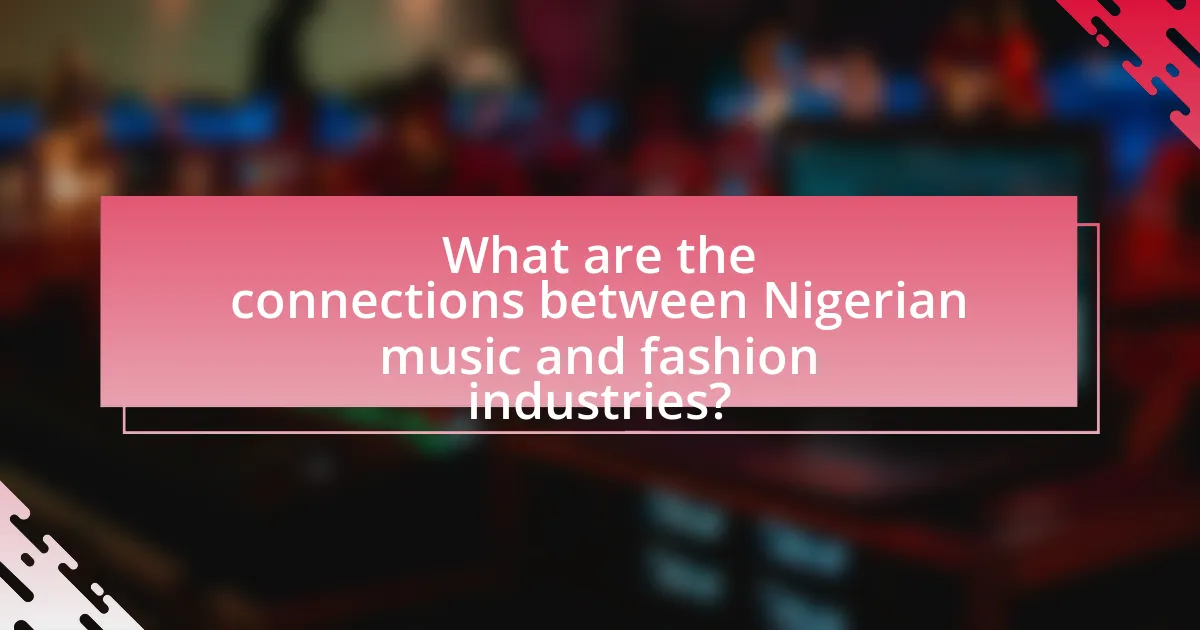
What are the connections between Nigerian music and fashion industries?
Nigerian music and fashion industries are interconnected through cultural expression and influence, with musicians often serving as fashion icons. Artists like Burna Boy and Wizkid frequently showcase traditional and contemporary Nigerian attire in their music videos and performances, promoting local designers and styles. This visibility drives trends within the fashion industry, as fans emulate the looks of their favorite artists, leading to increased demand for specific clothing styles and accessories. Furthermore, collaborations between musicians and fashion brands, such as the partnership between Davido and the luxury brand, have solidified this relationship, demonstrating how music can shape fashion narratives in Nigeria and beyond.
How do fashion designers draw inspiration from Nigerian music?
Fashion designers draw inspiration from Nigerian music by incorporating its vibrant rhythms, cultural narratives, and visual aesthetics into their collections. The dynamic nature of genres like Afrobeats influences color palettes, patterns, and silhouettes, reflecting the energy and spirit of the music. For instance, designers often use bold prints and intricate beadwork that resonate with the themes and styles prevalent in Nigerian music videos and performances. This connection is evident in the works of designers such as Deola Sagoe and Lisa Folawiyo, who have explicitly cited Nigerian music as a source of creative fuel, showcasing how the cultural significance of music translates into fashion statements that celebrate Nigerian heritage and contemporary style.
What are some notable fashion collections inspired by Nigerian music?
Notable fashion collections inspired by Nigerian music include the “Afrobeats Collection” by designer Lisa Folawiyo, which incorporates vibrant colors and patterns reflective of the genre’s energy. Another significant collection is “The Lagos Fashion Week 2020” showcase, featuring designs that celebrate the cultural heritage and musical influences of Nigerian artists. Additionally, the “Nigerian Music Video Fashion” trend has led to various designers creating pieces that mirror the styles seen in popular music videos, further bridging the gap between music and fashion. These collections highlight the dynamic relationship between Nigerian music and contemporary fashion, showcasing how musical themes and aesthetics influence design choices.
How do music festivals influence fashion choices among attendees?
Music festivals significantly influence fashion choices among attendees by promoting unique styles that reflect the cultural and musical themes of the events. Attendees often adopt outfits that resonate with the festival’s vibe, leading to the emergence of trends that blend traditional and contemporary fashion elements. For instance, Nigerian music festivals showcase vibrant colors, bold patterns, and traditional attire, which attendees embrace, thereby reinforcing cultural identity and creativity in their fashion choices. This phenomenon is supported by the rise of social media platforms where festival-goers share their outfits, further amplifying the impact of music festivals on fashion trends across Africa.
What impact does social media have on the relationship between music and fashion?
Social media significantly enhances the relationship between music and fashion by providing a platform for artists to showcase their style and influence trends. For instance, Nigerian musicians like Burna Boy and Wizkid utilize platforms such as Instagram and TikTok to share their fashion choices, which often leads to increased visibility and popularity of specific styles. This visibility can result in immediate consumer demand, as fans seek to emulate the looks of their favorite artists. According to a study by the Journal of Fashion Marketing and Management, social media has become a critical tool for fashion brands to connect with music artists, leading to collaborations that merge musical identity with fashion branding. This synergy not only shapes consumer behavior but also drives the evolution of fashion trends within the African context, particularly influenced by the vibrant aesthetics of Nigerian music culture.
How do platforms like Instagram and TikTok amplify fashion trends from Nigerian music?
Platforms like Instagram and TikTok amplify fashion trends from Nigerian music by enabling rapid visual sharing and engagement with content that features artists and their styles. These platforms allow users to create and disseminate short videos showcasing fashion influenced by popular Nigerian musicians, such as Burna Boy and Wizkid, who often set trends through their music videos and public appearances. The viral nature of these platforms means that fashion styles associated with these artists can quickly gain traction, as users replicate and share looks, leading to widespread adoption. For instance, the #NigerianFashion hashtag on Instagram has garnered millions of posts, illustrating the significant impact of Nigerian music on fashion trends across Africa and beyond.
What role do influencers play in promoting fashion inspired by Nigerian music?
Influencers play a crucial role in promoting fashion inspired by Nigerian music by leveraging their platforms to showcase and popularize styles that reflect the vibrant culture and aesthetics of the music scene. They often collaborate with designers and brands to create visibility for clothing that resonates with the themes and imagery found in Nigerian music, such as Afrobeats and hip-hop. For instance, influencers frequently wear outfits that feature traditional fabrics and contemporary designs, which helps to bridge the gap between music and fashion, making these styles more accessible to a broader audience. This dynamic not only enhances the visibility of Nigerian fashion but also drives trends across Africa and beyond, as influencers have the power to shape consumer preferences and inspire new fashion movements.
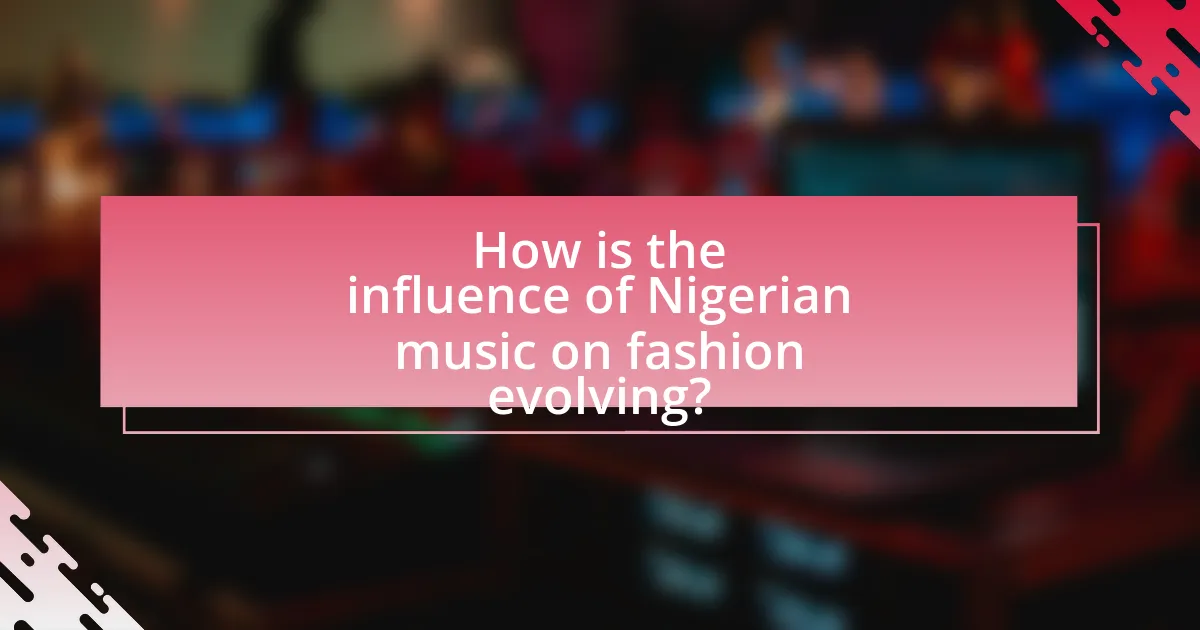
How is the influence of Nigerian music on fashion evolving?
The influence of Nigerian music on fashion is evolving through the integration of traditional styles with contemporary trends, driven by artists who showcase unique aesthetics in their music videos and public appearances. For instance, musicians like Burna Boy and Wizkid often wear outfits that blend African prints with modern designs, promoting a fusion that resonates with both local and global audiences. This evolution is further evidenced by the rise of fashion collaborations between musicians and designers, such as the partnership between Tiwa Savage and Nigerian fashion brand, Tadaaa, which highlights the growing intersection of music and fashion in Nigeria.
What trends are emerging in the intersection of Nigerian music and fashion?
Emerging trends at the intersection of Nigerian music and fashion include the rise of Afrocentric styles, the incorporation of traditional fabrics into contemporary designs, and the influence of music artists as fashion icons. Nigerian musicians like Burna Boy and Wizkid are not only shaping musical landscapes but also setting fashion trends by showcasing unique styles that blend traditional African attire with modern streetwear. This fusion is evident in the popularity of items such as Ankara prints and bold accessories, which are increasingly featured in music videos and performances. Additionally, collaborations between fashion designers and musicians are becoming more common, further solidifying the connection between these two cultural domains.
How are traditional Nigerian garments being reinterpreted in modern fashion?
Traditional Nigerian garments are being reinterpreted in modern fashion through the integration of contemporary design elements, innovative fabrics, and global fashion trends. Designers are blending traditional styles, such as the agbada and buba, with modern silhouettes and materials, creating hybrid pieces that appeal to both local and international markets. For instance, the use of Ankara fabric in tailored suits and streetwear has gained popularity, showcasing a fusion of cultural heritage and modern aesthetics. This reinterpretation is further evidenced by fashion shows and events, such as Lagos Fashion Week, where designers prominently feature traditional motifs in avant-garde designs, reflecting a growing appreciation for cultural identity in contemporary fashion.
What future directions can we expect in this cultural crossover?
Future directions in the cultural crossover between Nigerian music and fashion trends in Africa include increased collaboration between artists and fashion designers, leading to innovative styles that reflect musical themes. This trend is supported by the rise of social media platforms, which facilitate the rapid dissemination of fashion influenced by music, as seen with artists like Burna Boy and Wizkid, who often showcase unique outfits in their music videos. Additionally, the growing global interest in Afrobeats is likely to inspire international fashion brands to incorporate African aesthetics into their collections, further blending cultural elements. This evolution is evidenced by events like Lagos Fashion Week, which increasingly features music as a central component, highlighting the interconnectedness of these two cultural spheres.
What practical tips can fashion enthusiasts take from Nigerian music trends?
Fashion enthusiasts can adopt vibrant colors and bold patterns inspired by Nigerian music trends. Nigerian artists often showcase eclectic styles that blend traditional attire with contemporary fashion, emphasizing the use of bright hues and intricate designs. For instance, the popularity of Afrobeats has led to a resurgence of traditional fabrics like Ankara, which are frequently worn by musicians during performances and music videos. This trend encourages fashion enthusiasts to experiment with unique prints and textures, reflecting the rich cultural heritage of Nigeria while making a statement in their personal style.
How can individuals incorporate elements of Nigerian music-inspired fashion into their wardrobe?
Individuals can incorporate elements of Nigerian music-inspired fashion into their wardrobe by selecting vibrant prints, bold colors, and unique accessories that reflect the styles popularized by Nigerian artists. For instance, wearing clothing made from Ankara fabric, which is often featured in music videos and performances, can add a distinct cultural flair. Additionally, incorporating statement jewelry, such as beaded necklaces or earrings that are commonly seen in Nigerian music scenes, can enhance the overall look. The influence of Nigerian music on fashion is evident in the global popularity of these styles, as artists like Burna Boy and Wizkid showcase traditional attire blended with contemporary fashion, making it accessible and trendy for fans and fashion enthusiasts alike.
What are the best practices for following and adapting these trends sustainably?
The best practices for following and adapting trends from Nigerian music sustainably include prioritizing local materials, supporting local artisans, and promoting ethical production methods. By using locally sourced fabrics and materials, designers can reduce environmental impact and support the local economy. Collaborating with local artisans ensures that traditional craftsmanship is preserved while providing fair wages. Additionally, adopting ethical production practices, such as minimizing waste and ensuring fair labor conditions, contributes to sustainability in the fashion industry. These practices not only align with global sustainability goals but also enhance the cultural authenticity of the fashion influenced by Nigerian music.






